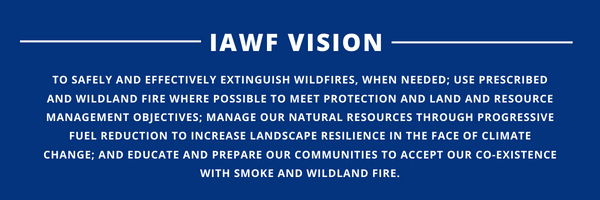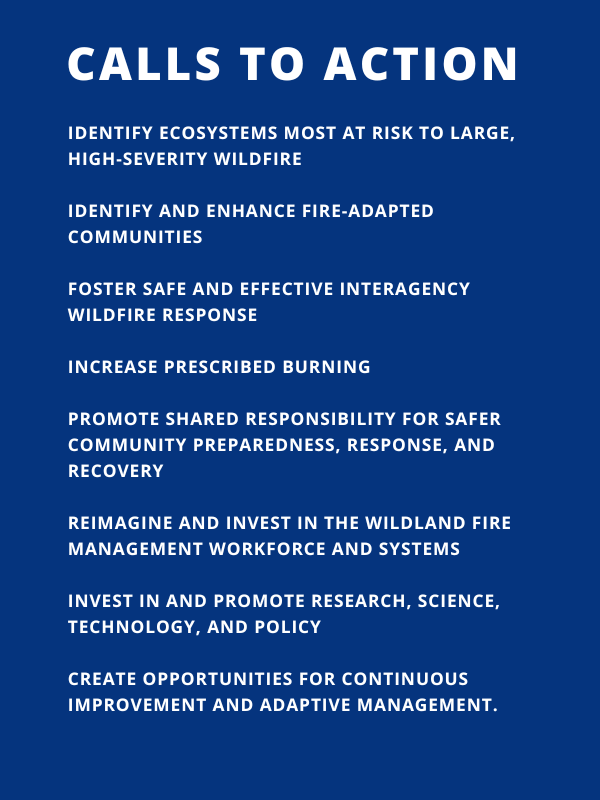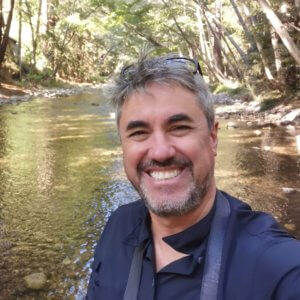PRESIDENT’S DESK
A CALL FOR ACTION ON FIRE AND CLIMATE
BY JOAQUIN RAMIREZ CISNEROS
As we gather in May in Pasadena and June in Melbourne for our association’s first Fire & Climate conference, I am happy to say that it is with a strong purpose because the challenge we face across landscape management, community risk and the safety of our wildland firefighters is clear. Our wildfire community sees first-hand that climate change is resulting in drying and warming trends across the world.
In January 2022, IAWF released a formal position statement on climate change and wildfire that sets forth our association’s vision and calls to action to our wildland fire community. We must act now to create the wider public collaboration required for this change. As the position paper acknowledges, “In many cases, fire seasons will lengthen, become more extreme and extend into landscapes previously unaffected by wildland fires. This will increase the risk to the health and safety of firefighters, the community, the environment, industries and the economy.”
Fire & Climate 2022 sets our focus in motion. I am excited as the session agendas demonstrate the breadth of our community’s efforts to address where the climate scenarios are taking the pyroscapes worldwide.
I am also thankful to IAWF’s past president, Alen Slijepcevic, who guided the development of the climate change position paper and the accepted vision it sets forth for IAWF’s future efforts. I feel that one of the strongest pronouncements made by the position paper is that prescribed burning must be implemented at all levels as a management tool in this new environment.
As IAWF’s position paper recognizes, “Prescribed burning and wildland fire used under prescriptive conditions can reduce the severity of future potential fire behavior, increase the potential success of containment efforts and maintain and improve the health and resiliency of ecosystems.” It also recognizes that such cross-jurisdictional activities require a shared responsibility and increased collaboration for success.
The position paper also acknowledges some sobering realities. First, that the complexity under which incident management teams operate is increasing and includes a more complex wildland urban interface. This reflects greater public scrutiny, the impacts of smoke on public health, and the specter of urban conflagration. Second, that our wildland firefighters face increased health and safety risks, including stress, fatigue and mental health strain due to extreme fires and less time for recovery between severe seasons.

To address these points, IAWF encourages a seven-point call to action to drive awareness and collaboration because this future is not one that we can tackle alone. These actions are supported by our belief that we must develop public understanding of the overarching long-term benefits of fire on the landscape, formulate and implement safe, effective, efficient risk-based wildland fire management decisions, and prioritize landscapes that are at the greatest risk for treatments and mitigation measures to withstand future change in fire regimes.
The broader global influences on wildfire mean that an all-inclusive approach to the future of wildland fire management is needed; this includes a new model for workforce development and an ecosystem approach to create greater effectiveness and efficiency in prescribed burning treatments over larger landscapes.

Our call to action is also based in support for active fire research programs that are shared with international and interagency collaboration to diversity information and identifying more nimble ways that our wildfire community can adapt to the rapidly changing conditions we all face.
As we meet in May in Pasadena and June in Melbourne and in your own work before and after the conference, consider how you can advance IAWF’s call to action on climate change and wildland fires.
On a final note, our brothers and sisters in Ukraine – a generous country that just last year sent support to Greece and Turkey during a terrible fire season – are suffering from a devastating war that has to stop. Just when we started to recover from the COVID-19 pandemic, the worst part of humankind reminds us again that our values of democracy cannot be taken for granted. Please consider supporting Ukraine in the many initiatives occurring, from organizations providing support in the field to the examples of colleagues from Portugal, France, Spain, Poland, and the United States sending needed equipment. Solidarity is a trademark of our wildfire community and this is a good time to continue its practice.
ABOUT THE AUTHOR

Joaquin Ramirez Cisneros is a wildland fire technologist who has been working for the last 25 years to bridge the gap between scientists and end users. In 2013, Ramirez moved to San Diego from Spain, and now works with agencies worldwide trying to convert the best science into actionable tools. Ramirez is the creator of several of the most advanced fire behavior software model implementations and decision support systems, including the Wildfire Analyst and fiResponse software tools. Since 2011, Ramirez has co-ordinated the first European M.S. in Forest Fires (www.masterfuegoforestal.es) with Prof. Rodriguez Francisco y Silva (UCO) and Prof. Domingo Molina (UdL). Ramirez is a founder and active member of the Pau Costa Foundation. He earned his PhD in remote sensing and GIS at the University of Leon in 2003, an M.S. in forestry from the University of Lleida, and his B.S. in forest engineering from the Polytechnical University of Madrid, Spain.
